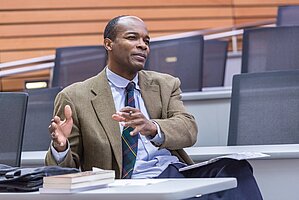Prof Dr Nigel Hatton, United States

1. Please describe your (scientific) work/research in a short way.
I received a dual PhD degree in Modern Thought & Literature and The Humanities with a minor in Political Theory from Stanford University. My interests and research sit at the intersections of literature and philosophy generally, but I understand the critical production and relationship of those intersections, their affinities, antimonies, and ruptures, as a form of praxis—writing and reading as right, rights, and rites. In other words, I consider discourse generated from the pressuring of literary texts and philosophical ideas as important developments for addressing crucial questions about the human condition. In this way, I work with the philosophical idea or literary scene, the treatise or the novel, not only in the university or research institute, but also in the prison, the courtroom, the clinic, the disenfranchised neighborhood, all of which have at some point served or continue to serve as domains and dialogic spaces for my research and writing. Novelists and philosophers, many of them, have an obsession with justice; because this is true, I want to translate their justice from its aesthetic and abstract forms into research for intervention in places where justice and legal systems require rethinking and reconfigured notions of human dignity, respect, solidarity, and reconciliation.
2. Which aspect of a sustainable life, work and research is especially relevant for you and why?
Knowledge production, whether it comes from France, Ghana, Vietnam, or the indigenous Americas, for example, must be respected, valued, and made legible in global marketplaces of ideas. We must address epistemological violence and ontological erasure because they manage to operate with an intellectual impunity that leaves victims of physical and psychic violence unable to identify the architects of inhumanity who enable material injustice. The Enlightenment, when misused or misunderstood, can beget violence and marginalization, and must be properly located within in a global interconnectedness of knowledge production across cultures, nations, and peoples. Sustainable life requires respect, dignity, and legibility of knowledge un-centered in one particular that then commands the universal.
3. What would be your wish for the future (and why) with this regard?
I genuinely hope for an end to social inequality, wealth disparity, and, the waste of human life that social inequality and wealth disparity encourage and celebrate within global capitalism. I work primarily at universities in the United States, a country where it is possible to see amazing advancements and inventions of the human mind one day, and people dying medieval deaths the next. There is a similar paradox happening across the world, and, as our leaders at the United Nations and elsewhere point out, we can certainly continue our scientific and technological advancements, but we must stop the violent loss of human life.
4. How is the Corona crisis affecting you in your every-day life and work?
My despair has increased because it seems as if suffering and death have become even more prevalent. The 21st century dares to be in competition with the bloodiness and loss of the 20th. Despair, however, is merely an activity that ideally leads to hope and possibilities for transcendence. The pandemic and protests against racial injustice over the past year have led many who were unaware of inequality and the vulnerability of human life to see the world in new ways. I wish it did not require a pandemic to change their ways of seeing, but the change is promising nevertheless. Researchers, policy makers, and even corporatists, who could ignore certain social justice and human life oriented questions in the past, no longer have the right to claim such naiveté. I would say this is an opportune moment for those of us who have been thinking about the human condition all along.


